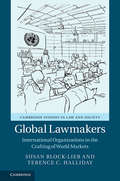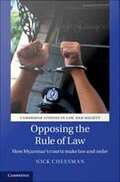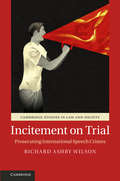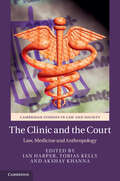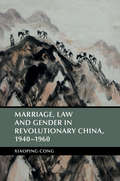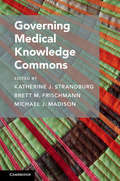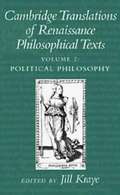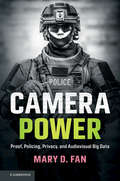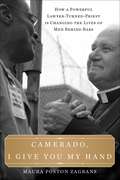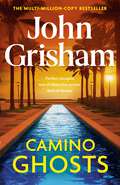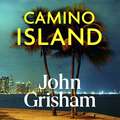- Table View
- List View
Cambridge Studies in Law and Society: Diversity in Practice
by Headworth, Spencer and Nelson, Robert L. and Dinovitzer, Ronit and Wilkins, David B. Spencer Headworth Robert L. Nelson Ronit Dinovitzer David B. WilkinsExpressions of support for diversity are nearly ubiquitous among contemporary law firms and corporations. Organizations back these rhetorical commitments with dedicated diversity staff and various diversity and inclusion initiatives. Yet, the goal of proportionate representation for people of color and women remains unrealized. Members of historically underrepresented groups remain seriously disadvantaged in professional training and work environments that white, upper-class men continue to dominate. While many professional labor markets manifest patterns of demographic inequality, these patterns are particularly pronounced in the law and elite segments of many professions. Diversity in Practice analyzes the disconnect between expressed commitments to diversity and practical achievements, revealing the often obscure systemic causes that drive persistent professional inequalities. These original contributions build on existing literature and forge new paths in explaining enduring patterns of stratification in professional careers. These more realistic assessments provide opportunities to move beyond mere rhetoric to something approaching diversity in practice.
Cambridge Studies in Law and Society: Indigeneity and Legal Pluralism in India
by Pooja ParmarAs calls for reparations to indigenous peoples grow on every continent, issues around resource extraction and dispossession raise complex legal questions. What do these disputes mean to those affected? How do the narratives of indigenous people, legal professionals, and the media intersect? In this richly layered and nuanced account, Pooja Parmar focuses on indigeneity in the widely publicized controversy over a Coca-Cola bottling facility in Kerala, India. Juxtaposing popular, legal, and Adivasi narratives, Parmar examines how meanings are gained and lost through translation of complex claims into the languages of social movements and formal legal systems. Included are perspectives of the diverse range of actors involved, based on interviews with members of Adivasi communities, social activists, bureaucrats, politicians, lawyers, and judges. Presented in clear, accessible prose, Parmar's account of translation enriches debates in the fields of legal pluralism, indigeneity, and development.
Cambridge Studies in Law and Society: International Organizations in the Crafting of World Markets (Cambridge Studies in Law and Society)
by Susan Halliday Terence C. Block-LiebGlobal lawmaking by international organizations holds the potential for enormous influence over world trade and national economies. Representatives from states, industries, and professions produce laws for worldwide adoption in an effort to alter state lawmaking and commercial behaviors, whether of giant multi-national corporations or micro, small and medium-sized businesses. Who makes that law and who benefits affects all states and all market players. Global Lawmakers offers the first extensive empirical study of commercial lawmaking within the United Nations. It shows who makes law for the world, how they make it, and who comes out ahead. Using extensive and unique data, the book investigates three episodes of lawmaking between the late 1990s and 2012. Through its original socio-legal orientation, it reveals dynamics of competition, cooperation and competitive cooperation within and between international organizations, including the UN, World Bank, IMF and UNIDROIT, as these IOs craft international laws. Global Lawmakers proposes an original theory of international organizations that seek to construct transnational legal orders within social ecologies of lawmaking. The book concludes with an appraisal of creative global governance by the UN in international commerce over the past fifty years and examines prospective challenges for the twenty-first century.
Cambridge Studies in Law and Society: Investing in Authoritarian Rule
by Anuradha ChakravartyThis book shows how Rwanda's transitional courts that tried genocide crimes - the gacaca - produced social complicity and cemented authoritarian rule. It is unique for its in-depth investigation of the courts' legal operations: confessions, denunciation, and lay judging, and shows how targeted incentives such as grants of clemency, opportunities for private gain, and career advancement drew the masses into the orbit of the ethnic minority-dominated regime. Using previously untapped data, it illustrates how a decade of mass trials constructed a tacit patronage-driven relationship in which the interests of the citizenry became tied to the authoritarian elite that had discretionary power to grant or withdraw those benefits at will. The operation of law in individual behavior and authoritarian control presented in this volume will be of use to students and scholars in the social sciences, and practitioners interested in criminal law and transitional justice.
Cambridge Studies in Law and Society: Iraq and the Crimes of Aggressive War
by John HaganFrom the torture of detainees at Abu Ghraib to unnecessary military attacks on civilians, this book is an account of the violations of international criminal law committed during the United States invasion of Iraq. Taking stock of the entire war, it uniquely documents the overestimation of the successes and underestimation of the failings of the Surge and Awakening policies. The authors show how an initial cynical framing of the American war led to the creation of a new Shia-dominated Iraq state, which in turn provoked powerful feelings of legal cynicism among Iraqis, especially the Sunni. The predictable result was a resilient Sunni insurgency that re-emerged in the violent aftermath of the 2011 withdrawal. Examining more than a decade of evidence, this book makes a powerful case that the American war in Iraq constituted a criminal war of aggression.
Cambridge Studies in Law and Society: Opposing the Rule of Law
by Nick CheesmanThe rule of law is a political ideal today endorsed and promoted worldwide. Or is it? In a significant contribution to the field, Nick Cheesman argues that Myanmar is a country in which the rule of law is 'lexically present but semantically absent'. Charting ideas and practices from British colonial rule through military dictatorship to the present day, Cheesman calls upon political and legal theory to explain how and why institutions animated by a concern for law and order oppose the rule of law. Empirically grounded in both Burmese and English sources, including criminal trial records and wide ranging official documents, Opposing the Rule of Law offers the first significant study of courts in contemporary Myanmar. It sheds new light on the politics of courts during dark times and sharply illuminates the tension between the demand for law and the imperatives of order.
Cambridge Studies in Law and Society: Palaces of Hope
by Ronald Niezen Maria SapignoliThis volume assembles in one place the work of scholars who are making key contributions to a new approach to the United Nations, and to global organizations and international law more generally. Anthropology has in recent years taken on global organizations as a legitimate source of its subject matter. The research that is being done in this field gives a human face to these world-reforming institutions. Palaces of Hope demonstrates that these institutions are not monolithic or uniform, even though loosely connected by a common organizational network. They vary above all in their powers and forms of public engagement. Yet there are common threads that run through the studies included here: the actions of global institutions in practice, everyday forms of hope and their frustration, and the will to improve confronted with the realities of nationalism, neoliberalism, and the structures of international power.
Cambridge Studies in Law and Society: Prosecuting International Speech Crimes (Cambridge Studies in Law and Society)
by Wilson Richard AshbyInternational and national armed conflicts are usually preceded by a media campaign in which public figures foment ethnic, national, racial or religious hatred, inciting listeners to acts of violence. Incitement on Trial evaluates the efforts of international criminal tribunals to hold such inciters criminally responsible. This is an unsettled area of international criminal law, and prosecutors have often struggled to demonstrate a causal connection between speech acts and subsequent crimes. This book identifies 'revenge speech' as the type of rhetoric with the greatest effects on empathy and tolerance for violence. Wilson argues that inciting speech should be handled under the preventative doctrine of inchoate crimes, but that once international crimes have been committed, then ordering and complicity are the most appropriate forms of criminal liability. Based in extensive original research, this book proposes an evidence-based risk assessment model for monitoring political speech.
Cambridge Studies in Law and Society: Shifting Legal Visions
by González-Ocantos Ezequiel A.What explains the success of criminal prosecutions against former Latin American officials accused of human rights violations? Why did some judiciaries evolve from unresponsive bureaucracies into protectors of victim rights? Using a theory of judicial action inspired by sociological institutionalism, this book argues that this was the result of deep transformations in the legal preferences of judges and prosecutors. Judicial actors discarded long-standing positivist legal criteria, historically protective of conservative interests, and embraced doctrines grounded in international human rights law, which made possible innovative readings of constitutions and criminal codes. Litigants were responsible for this shift in legal visions by activating informal mechanisms of ideational change and providing the skills necessary to deal with complex and unusual cases. Through an in-depth exploration of the interactions between judges, prosecutors and human rights lawyers in three countries, the book asks how changing ideas about the law and standards of adjudication condition the exercise of judicial power.
Cambridge Studies in Law and Society: The Clinic and the Court
by Tobias Kelly Ian Harper Harper, Ian and Kelly, Tobias and Khanna, Akshay Akshay KhannaLaw and medicine can be caught in a tight embrace. They both play a central role in the politics of harm, making decisions regarding what counts as injury and what might be the most suitable forms of redress or remedy. But where do law and medicine converge and diverge in their responses to and understandings of harm and suffering? Using empirical case studies from Europe, the Americas and Africa, The Clinic and the Court brings together leading medical and legal anthropologists to explore this question.
Cambridge Studies in Religion, Philosophy, and Society: Ethics and Religion
by Harry J. GenslerMany people question whether God is the source of morality. Under divine command theory, God's will creates the moral order, and therefore ethical truths are true because of God's will. Under natural law, on the other hand, some ethical truths do not depend on God's will, and yet perhaps they depend on his reason or creation. Ethics and Religion develops strong, defensible, and original versions of both divine command theory and natural law. The book also discusses ethics and atheism: how atheists object on ethical grounds to belief in God and how they view ethics. The book defends belief in God from criticisms and analyzes related concepts, such as practical reason, the golden rule, ethics and evolution, the problem of evil, and the fine-tuning argument.
Cambridge Studies in the History of the People’s Republic of China: Marriage, Law, and Gender in Revolutionary China, 1940–1960
by Xiaoping CongXiaoping Cong examines the social and cultural significance of Chinese revolutionary legal practice in the construction of marriage and gender relations. Her book is an empirically rich investigation of the ways in which a 1943 legal dispute over an arranged marriage in a Chinese village became a legal, political and cultural exemplar on the national stage. This conceptually groundbreaking study revisits the Chinese Revolution and its impact on women and society by presenting a Chinese experience that cannot and should not be theorized in the framework of Western discourse. Taking a cultural historical perspective, Cong shows how the Chinese Revolution and its legal practices produced new discourses, neologisms and cultural symbols that contained China's experience in twentieth-century social movements, and how revolutionary practice was sublimated into the concept of 'self-determination', an idea that bridged local experiences with the tendency of the twentieth-century world, and that is a revolutionary legacy for China today.
Cambridge Studies on Governing Knowledge Commons: Governing Medical Knowledge Commons (Cambridge Studies on Governing Knowledge Commons)
by Michael J. Strandburg Katherine J. Frischmann Brett M. MadisonGoverning Medical Knowledge Commons makes three claims: first, evidence matters to innovation policymaking; second,evidence shows that self-governing knowledge commons support effective innovation without prioritizing traditional intellectual property rights; and third, knowledge commons can succeed in the critical fields of medicine and health. The editors' knowledge commons framework adapts Elinor Ostrom's groundbreaking research on natural resource commons to the distinctive attributes of knowledge and information, providing a systematic means for accumulating evidence about how knowledge commons succeed. The editors' previous volume, Governing Knowledge Commons, demonstrated the framework's power through case studies in a diverse range of areas. Governing Medical Knowledge Commons provides fifteen new case studies of knowledge commons in which researchers, medical professionals, and patients generate, improve, and share innovations, offering readers a practical introduction to the knowledge commons framework and a synthesis of conclusions and lessons. The book is also available as Open Access.
Cambridge Texts in the History of Political Thought: Plato
by Tom Griffith Malcolm SchofieldPresented in the popular Cambridge Texts format are three early Platonic dialogues in a new English translation by Tom Griffith that combines elegance, accuracy, freshness and fluency. Together they offer strikingly varied examples of Plato's critical encounter with the culture and politics of fifth and fourth century Athens. Nowhere does he engage more sharply and vigorously with the presuppositions of democracy. The Gorgias is a long and impassioned confrontation between Socrates and a succession of increasingly heated interlocutors about political rhetoric as an instrument of political power. The short Menexenus contains a pastiche of celebratory public oratory, illustrating its self-delusions. In the Protagoras, another important contribution to moral and political philosophy in its own right, Socrates takes on leading intellectuals (the 'sophists') of the later fifth century BC and their pretensions to knowledge. The dialogues are introduced and annotated by Malcolm Schofield, a leading authority on ancient Greek political philosophy.
Cambridge Translations of Renaissance Philosophical Texts: Volume I Moral Philosophy
by Jill KrayeThe Renaissance, known primarily for the art and literature that it produced, was also a period in which philosophical thought flourished. This two-volume anthology contains 40 new translations of important works on moral and political philosophy written during the Renaissance and hitherto unavailable in English. The anthology is designed to be used in conjunction with The Cambridge History of Renaissance Philosophy, in which all of these texts are discussed. The works, originally written in Latin, Italian, French, Spanish, and Greek, cover such topics as: concepts of man, Aristotelian, Platonic, Stoic, and Epicurean ethics, scholastic political philosophy, theories of princely and republican government in Italy and northern European political thought. Each text is supplied with an introduction and a guide to further reading.
Cambridge Translations of Renaissance Philosophical Texts: Volume II Political Philosophy
by Jill KrayeThe anthology is designed to be used in conjunction with The Cambridge History of Renaissance Philosophy, in which all of these texts are discussed. The works, originally written in Latin, Italian, French, Spanish and Greek, cover such topics as: scholastic political philosophy; theories of princely and republican government in Italy; and northern European political thought. Each text is supplied with an introduction and a guide to further reading.
Cambridge and the World Intellectual Property Organization: The Informal Economy in Developing Nations
by Erika Kraemer-Mbula Sacha Wunsch-VincentThe informal economy represents a significant share of output and employment in many developing countries. Yet little is known about this hidden engine of innovation. This pioneering study addresses some crucial questions, including: what is the role of the informal sector in economic development? How does innovation occur in the informal economy? How does it spread, who are the key actors and what impacts does it have? How do inventors and entrepreneurs in the informal economy reap benefits from their innovations? What stops informal sector innovation from scaling up? How can informal sector innovation in developing countries be measured? And what policies might support informal sector innovation and improve its impacts? This book will stimulate further work on this crucial but under-researched subject. As well as rich empirical evidence from several groundbreaking studies, it includes conceptual and methodological tools and policy recommendations to help researchers and policy-makers understand innovation in the informal economy. Opens a window to an important facet of innovation which has not been explored before Innovation within the informal sector is examined both conceptually and through several empirical studies Lays important groundwork for future empirical work, and for the development of appropriate metrics
Cambridge studies in international and comparative law: Civil Liability in Europe for Terrorism-Related Risk
by Niels Philipsen Bergkamp, Lucas and Faure, Michael and Hinteregger, Monika and Philipsen, Niels Lucas Bergkamp Michael Faure Monika HintereggerToday terrorism has become a world-wide phenomenon which does not stop at the European borders. Following the 9/11 attacks on the World Trade Centre and terrorist attacks in Paris, Madrid and London, concerns have arisen in Europe about potential liability exposure for terrorism-related damage. This book tackles the problem of civil liability for damage caused by terrorist acts from several angles. The authors expertly deliver a comprehensive analysis of terrorism-related risk under international and EU law and the national tort law systems of seven representative EU Member States. They also provide a comparison of the situation in Europe to the liability environment in the US. Risk mitigation strategies are considered and critically assessed, as are alternative systems for redressing terrorism-related risks. The book concludes with a reflection on the analysis and presents possible strategies for future regulation by the European lawmakers.
Cambridge studies in international and comparative law: Proportionality and Deference in Investor-State Arbitration
by Caroline HenckelsIn this study, Caroline Henckels examines how investment tribunals have balanced the competing interests of host states and foreign investors in determining state liability in disputes concerning the exercise of public power. Analyzing the concepts of proportionality and deference in investment tribunals' decision-making in comparative perspective, the book proposes a new methodology for investment tribunals to adopt in regulatory disputes, which combines proportionality analysis with an institutionally sensitive approach to the standard of review. Henckels argues that adopting a modified form of proportionality analysis would provide a means for tribunals to decide cases in a more consistent and coherent manner leading to greater certainty for both states and investors, and that affording due deference to host states in the determination of liability would address the concern that the decisions of investment tribunals unjustifiably impact on the regulatory autonomy of states.
Cambridge studies in law and society: Lost in China?
by Jones, Carol A. G.Rule of law is a core Hong Kong value, providing a defensive wall around the territory and protecting its way of life against 'mainlandisation'. Before the 1997 retrocession to China, fears were widespread that the rights and freedoms enjoyed under colonial rule would be eroded, that the rule of law would be weakened and that corruption would increase. Soon, the first blows were struck against the rule of law via an NPCSC ruling which overturned the judgment of the Court of Final Appeal. Successive interventions by Beijing in Hong Kong's legal and political affairs have given rise to fears about the loss of the rule of law and loss of identity. These fears have subsequently provoked mass street demonstrations, including the 'Umbrella Revolution' of 2014. But, as this book shows, Hong Kongers also use less explicit arts of resistance to maintain their identity.
Camera Power: Proof, Policing, Privacy, and Audiovisual Big Data
by Mary D. FanCamera Power is the first book to tackle the policy questions raised by two ongoing revolutions in recording the police: copwatching and police-worn body cameras. Drawing on original research from over 200 jurisdictions and more than 100 interviews - with police leaders and officers, copwatchers, community members, civil rights and civil liberties experts, industry leaders, and technologists - Mary D. Fan offers a vision of the great potential and perils of the growing deluge of audiovisual big data. In contrast to the customary portrayal of big data mining as a threat to civil liberties, Camera Power describes how audiovisual big data analytics can better protect civil rights and liberties and prevent violence in police encounters. With compelling stories and coverage of the most important debates over privacy, public disclosure, proof, and police regulation, this book should be read by anyone interested in how technology is reshaping the relationship with our police.
Camerado, I Give You My Hand: How a Powerful Lawyer-Turned-Priest Is Changing the Lives of Men Behind Bars
by Maura Poston Zagrans David T. LinkFor many years Dr. David T. Link helped young men and women prepare to become lawyers. After his wife died, and at a time in his life when most people retire, Dr. Link felt called to serve the Church and to aid the men that his profession normally put behind bars, ministering healing and forgiveness to murderers, thieves, and what many would call the least of society. This is a book about the value of human life, and about the transformative power of friendship and compassion. Meeting Father Dave gives us hope that one person can make a difference and, through successive reinterpretations of his own life's purpose, he makes the case for adding our own unique gifts to help the least of these, our brothers and sisters from all walks of life."Song of the Open Road" by Walt WhitmanCamerado, I give you my hand! I give you my love more precious than money, I give you myself before preaching or law; Will you give me yourself? will you come travel with me? Shall we stick by each other as long as we live?
Camino Ghosts: The new thrilling novel from Sunday Times bestseller John Grisham
by John GrishamFollowing John Grisham's international bestsellers, Camino Island and Camino Winds, Camino Ghosts is the story of an island off the Florida coast with a haunted, violent history and an uncertain future.Dark Isle off the Florida coast is said to be cursed: drownings, disappearances and hauntings have been the fate of intruders. The people who lived there were once enslaved. Now abandoned, it is the target of greedy developers. Lovely Jackson is the last survivor and claims to be its legal owner. But there is not a shred of evidence to prove that is true. It's unlikely that the developers will be deterred by the claims of one old woman. They have millions; Lovely only has Steve Mahon, a pro bono environmental lawyer, and Mercer Mann, a floundering novelist, to fight in her corner. With the court case looming and the bulldozers waiting to roll in, Steve and Mercer are in a race against time to unearth the truth behind Lovely's story and save the legacy of the island.Praise for Camino Winds:'In American icon John Grisham's new novel, Camino Winds, an odd assortment of mystery and crime authors, some of them felons themselves, discover one of their colleagues has been murdered during the fury of a massive hurricane-the perfect crime scene' Delia Owens, author of Where the Crawdads Sing'The Camino Island series, featuring trouble-prone bookseller Bruce Cable, is a perfect escapist mix of detective action, insider riffs on the literary world - and even a little romance' Mail on Sunday'Camino Winds has all the usual Grisham hallmarks - a pacy plot and tension-filled scenes' Independent'Another compelling read from Grisham, and will satisfy old fans and please new readers alike' Press Association
Camino Ghosts: The thrilling Sunday Times bestseller (June 2024) from John Grisham
by John GrishamFollowing John Grisham's international bestsellers, Camino Island and Camino Winds, Camino Ghosts is the story of an island off the Florida coast with a haunted, violent history and an uncertain future.Dark Isle off the Florida coast is said to be cursed: drownings, disappearances and hauntings have been the fate of intruders. The people who lived there were once enslaved. Now abandoned, it is the target of greedy developers. Lovely Jackson is the last survivor and claims to be its legal owner. But there is not a shred of evidence to prove that is true. It's unlikely that the developers will be deterred by the claims of one old woman. They have millions; Lovely only has Steve Mahon, a pro bono environmental lawyer, and Mercer Mann, a floundering novelist, to fight in her corner. With the court case looming and the bulldozers waiting to roll in, Steve and Mercer are in a race against time to unearth the truth behind Lovely's story and save the legacy of the island.Praise for Camino Winds:'In American icon John Grisham's new novel, Camino Winds, an odd assortment of mystery and crime authors, some of them felons themselves, discover one of their colleagues has been murdered during the fury of a massive hurricane-the perfect crime scene' Delia Owens, author of Where the Crawdads Sing'The Camino Island series, featuring trouble-prone bookseller Bruce Cable, is a perfect escapist mix of detective action, insider riffs on the literary world - and even a little romance' Mail on Sunday'Camino Winds has all the usual Grisham hallmarks - a pacy plot and tension-filled scenes' Independent'Another compelling read from Grisham, and will satisfy old fans and please new readers alike' Press AssociationCamino Ghosts was a Sunday Times top five bestseller in the first week of June 2024.
Camino Island: Sunday Times bestseller
by John GrishamAll trails became dead-ends. Tips that had at first seemed urgent now faded away. The waiting game began. Whoever had the manuscripts would want money, and a lot of it. They would surface eventually, but where and when, and how much would they want?The most daring and devastating heist in literary history targets a high security vault located deep beneath Princeton University.Valued at $25 million (though some would say priceless) the five manuscripts of F Scott Fitzgerald's only novels are amongst the most valuable in the world. After an initial flurry of arrests, both they and the ruthless gang of thieves who took them have vanished without trace.Dealing in stolen books is a dark business, and few are initiated to its arts - which puts Bruce Kable right on the FBI's Rare Asset Recovery Unit's watch list.A struggling writer burdened by debts, Mercer Mann spent summers on Florida's idyllic Camino Island as a kid, in her grandmother's beach cottage. Now she is being made an offer she can't refuse: to return to the peace of the island, to write her novel - and get close to a certain infamous bookseller, and his interesting collection of manuscripts . . .(P)2017 Random House Audio

